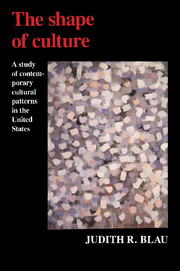Book contents
- Frontmatter
- Contents
- List of figures and tables
- Acknowledgements
- 1 Culture as structure and meaning
- 2 The American cultural landscape
- 3 Reproduction and decline
- 4 Co-occurrence, tipping in, and bridging
- 5 Organizational assembly and disassembly
- 6 Increasing returns on diminishing artists
- 7 A little more on the hobby horse
- 8 Masses and classes
- 9 The transformation of American culture
- Appendix A List of SMSAs and 1970 population in 100s
- Appendix B Sources and descriptions of cultural indicators
- Appendix C Log transformation
- Appendix D Polynomial term
- Index
- Other books in the series
9 - The transformation of American culture
Published online by Cambridge University Press: 06 July 2010
- Frontmatter
- Contents
- List of figures and tables
- Acknowledgements
- 1 Culture as structure and meaning
- 2 The American cultural landscape
- 3 Reproduction and decline
- 4 Co-occurrence, tipping in, and bridging
- 5 Organizational assembly and disassembly
- 6 Increasing returns on diminishing artists
- 7 A little more on the hobby horse
- 8 Masses and classes
- 9 The transformation of American culture
- Appendix A List of SMSAs and 1970 population in 100s
- Appendix B Sources and descriptions of cultural indicators
- Appendix C Log transformation
- Appendix D Polynomial term
- Index
- Other books in the series
Summary
The entropy of a gas of particles in equilibrium is easy to calculate; according to statistical mechanics it is proportional to the total number of particles. The more particles in the gas, the messier it can become, the larger its entropy.
Heinz R. Pagels, Perfect Symmetry (1985)The second law of thermodynamics states that a closed system can become more disordered (or stay the same), but it cannot become less disordered. The entropy of a gas reaches its maximum in its equilibrium state when the particles are random both with respect to the distribution of their positions and to their velocities. Under such “messy” conditions, observing an unusual combination of particles or any interesting configuration is rare. The first deal in a game of poker (that is, with one deck of cards that are thoroughly shuffled) is unlikely to yield a winning hand. There is a smaller probability of a chance encounter with a sociology colleague on a vacation than at the annual sociology meetings. Most people, in fact, arrange their lives to maximize the probabilities of interesting configurations. Social arrangements are, by definition, nonrandom. On varieties of social, economic, and political dimensions, cities have relatively much structure and they vary in the composition of people who live in them. However, on dimensions of culture we find that American cities vary surprisingly little, and that cultural patterns are not so highly structured.
- Type
- Chapter
- Information
- The Shape of CultureA Study of Contemporary Cultural Patterns in the United States, pp. 174 - 183Publisher: Cambridge University PressPrint publication year: 1989



